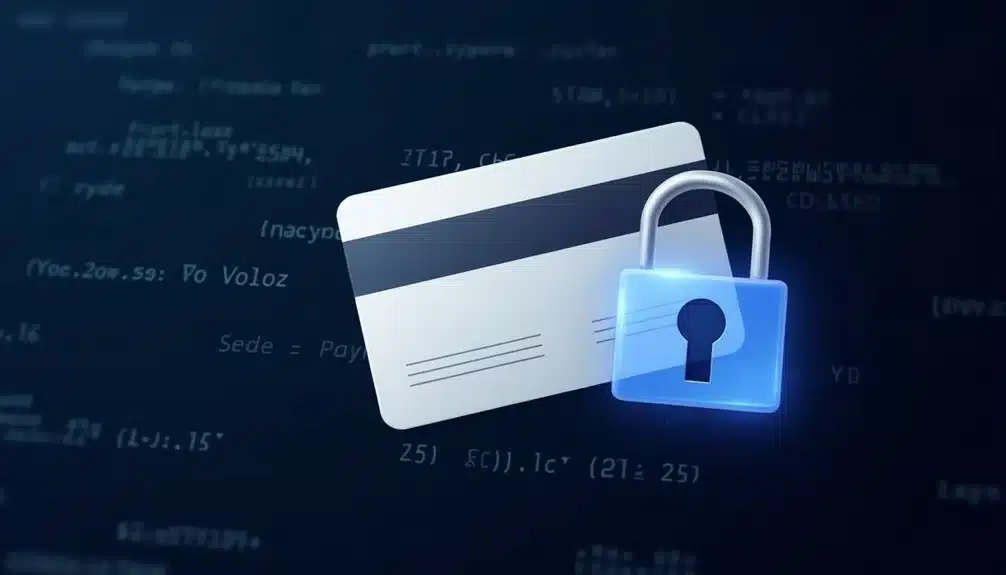You need to implement secure payment options to protect sensitive customer data and foster trust in online transactions. By doing so, you'll not only drive sales and revenue growth but also enhance your brand's reputation. Secure payment options, such as tokenization, SSL certificates, and PCI DSS compliance, minimize data breach risks and reassure customers about data protection. Additionally, offering diverse payment options, like digital wallets and cryptocurrencies, increases customer convenience and security. As you explore the importance of secure payment options, you'll discover how robust security measures can mitigate unauthorized transaction risks and boost consumer confidence online.
Key Takeaways
- Secure payment options enhance customer trust and loyalty through transparent communication of fees and protocols, fostering brand loyalty.
- Robust payment security measures, such as encryption and two-factor authentication, minimize data breach risks and protect sensitive information.
- Trust signals like SSL certificates and security badges enhance consumer confidence, while positive online reviews build credibility and trust in the brand.
- Offering diverse payment options, including digital payment methods and biometric authentication, increases customer convenience and security.
- Compliance with PCI DSS and implementation of tokenization technology are essential for securing sensitive payment information and maintaining customer trust.
Building Trust With Secure Payments

To establish a reputable online store, you need to lay the groundwork by implementing secure payment options, which in turn, paves the way for building trust with your customers. At DreamSite Gurus, we recognize that prioritizing payment security plays a significant role in the success of an e-commerce platform.
By integrating robust security measures, such as two-factor authentication and encryption, you're not only ensuring fraud prevention but also sending trust signals to your customers. A seamless and secure checkout process enhances the overall user experience, fostering a positive association with your brand.
To further solidify trust, it's vital to prioritize payment transparency. Clearly communicate the payment process, fees, and any security protocols in place. This openness helps establish brand loyalty, as customers feel confident in the security of their transactions.
Effective risk management also plays an important role in maintaining trust. Educating consumers about secure payment practices and the measures you have in place can empower them to make informed decisions.
Impact of Data Breaches on Business
Security breaches cast a long shadow over e-commerce businesses, threatening to erode the trust and loyalty that takes years to build. When you experience a data breach, you're not just losing customer data – you're also facing serious data breach consequences that can cripple your business.
Financial losses are a significant concern, with the average cost of a data breach exceeding $3.9 million. These losses aren't limited to the immediate costs of containing and resolving the breach; they also include the long-term impact on your reputation and customer base.
As noted in the marketing strategies from agencies like DreamSite Gurus who emphasize the importance of data protection, you'll also face regulatory fines and penalties, as well as potential lawsuits from affected customers.
In addition to these financial losses, you'll need to invest time and resources into notifying affected customers, providing credit monitoring, and implementing new security measures to prevent future breaches.
The impact on your business can be devastating, with some companies never fully recovering from the loss of customer trust. To mitigate these risks, it's crucial to prioritize secure payment options and robust data protection measures.
Payment Security Measures Explained

When implementing secure payment options, you're actively minimizing the risk of a data breach and its severe consequences. To achieve this, you need to employ robust payment security measures.
As highlighted by industry leaders, enhancing online visibility and protecting sensitive information are essential for building credibility and trust among users SEO importance.
Encryption techniques are a vital aspect of payment security, as they guarantee that sensitive data, such as credit card numbers and personal identifiable information, are protected from unauthorized access. You should utilize industry-standard encryption protocols, like Transport Layer Security (TLS) and Secure Sockets Layer (SSL), to safeguard data in transit.
Moreover, you must implement effective fraud prevention measures to detect and prevent suspicious transactions. This can be achieved through the use of machine learning algorithms, behavioral analytics, and real-time monitoring.
By analyzing transaction patterns and identifying anomalies, you can greatly reduce the risk of fraudulent activities. In addition, you should also implement security protocols, such as two-factor authentication and tokenization, to add an extra layer of protection to sensitive data.
Types of Secure Payment Options
Beyond safeguarding sensitive information through robust security measures, offering a variety of secure payment options is essential for e-commerce platforms. You want to provide your customers with flexible and convenient payment methods that also protect their sensitive information.
Here are some types of secure payment options you can consider:
- Digital Payment Methods: Mobile wallets, such as Apple Pay and Google Pay, and cryptocurrency payments, like Bitcoin and Ethereum, offer secure and contactless payments.
- Biometric Authentication: Implementing biometric authentication, such as facial recognition or fingerprint scanning, adds an extra layer of security to traditional payment methods.
- Virtual Invoicing: Digital invoices with built-in payment links enable customers to make secure payments online, reducing the risk of paper-based invoicing.
- Recurring Payments: Subscription billing and peer-to-peer transfers using virtual currency options provide a secure and convenient way to manage recurring payments.
Benefits of Tokenization Technology

Tokenization technology has become an important component in secure payment processing, and its benefits are multifaceted. You're likely to notice the tokenization benefits when you use a credit card to make an online purchase and the merchant stores your card information for future transactions. Instead of storing your actual card number, the system stores a unique token, effectively reducing the risk of card data breaches.
As a result, you experience enhanced security, since even if the token is compromised, it can't be used to make unauthorized transactions without the actual card information. Furthermore, tokens are specific to a particular merchant, making it useless for other merchants, which further reduces the risk of data breaches.
The use of tokens also reduces the burden of storing and managing sensitive card data, as merchants don't have to worry about storing sensitive information on their servers. This results in a more secure and trustworthy transaction environment for both merchants and consumers.
Role of SSL Certificates in Security
Building on the secure foundation established by tokenization technology, SSL certificates play an essential role in protecting sensitive payment information during online transactions.
When you implement SSL certificates on your e-commerce site, you're guaranteeing that all data exchanged between your customers' browsers and your server remains encrypted. This is made possible by SSL encryption, which scrambles data in transit, making it unintelligible to potential hackers.
Here's what you need to know about SSL certificates:
- Obtained from a trusted Certificate Authority (CA): You must purchase an SSL certificate from a reputable CA, which verifies your identity and guarantees that your site is legitimate.
- Activates HTTPS protocol: Installing an SSL certificate enables the HTTPS protocol, which is a secure version of HTTP.
- Guarantees data integrity: SSL certificates prevent data tampering, ensuring that information exchanged between parties remains accurate and unaltered.
- Complies with cybersecurity protocols: Having an SSL certificate demonstrates your commitment to following cybersecurity protocols, which helps establish trust with your customers.
PCI DSS Compliance Importance

Guaranteeing the security of sensitive payment information during online transactions involves more than just implementing SSL certificates. You also need to comply with the Payment Card Industry Data Security Standard (PCI DSS).
At DreamSite Gurus (DSG), we recognize the importance of comprehensive website development services in creating a secure online environment for e-commerce. PCI DSS is a set of security standards that aim to protect cardholder data and prevent credit card fraud.
A PCI requirements overview will help you grasp the six main goals of PCI DSS: maintaining a secure network, protecting cardholder data, implementing vulnerability management programs, enforcing strong access controls, regularly monitoring and testing systems, and maintaining an information security policy.
To guarantee compliance, you can use a PCI compliance checklist, which covers the 12 key requirements of PCI DSS. These requirements include installing and maintaining firewalls, encrypting cardholder data, and implementing anti-virus software.
You'll also need to ascertain that your systems and networks are regularly updated and patched, and that you're using secure protocols for transmitting cardholder data. By complying with PCI DSS, you'll be protecting your customers' sensitive payment information and maintaining the trust and security that's essential for successful e-commerce transactions.
Complying with PCI DSS is a critical step in maintaining the security of online transactions.
Secure Payment Gateway Options
Now that you've implemented PCI DSS compliance measures to protect sensitive payment information, you need to select a secure payment gateway to facilitate online transactions.
Your chosen payment gateway will play an essential role in ensuring the security and efficiency of your e-commerce transactions. You'll want to take into account the types of payment options it supports, such as mobile payment options, cryptocurrency payments, and digital wallet security.
When evaluating secure payment gateway options, take into account the following:
- Biometric authentication methods: Does the payment gateway support biometric authentication, such as fingerprint or facial recognition?
- Fraud detection solutions: Does the payment gateway offer advanced fraud detection solutions to mitigate the risk of unauthorized transactions?
- Payment processing fees: What're the payment processing fees associated with the payment gateway, and are they competitive?
- International payment solutions: Does the payment gateway support international payment solutions, allowing you to expand your customer base globally?
Boosting Consumer Confidence Online

Numerous studies have shown that a significant percentage of consumers abandon their online shopping carts due to concerns about payment security. To combat this, you need to prioritize boosting consumer confidence online. This involves understanding consumer behavior and what drives their trust in online transactions.
One effective way to do this is by showcasing trust signals, such as Secure Sockets Layer (SSL) certificates and security badges, on your website. As a top-rated marketing agency, DreamSite Gurus can help you implement these strategies effectively.
You should also optimize the user experience by streamlining the checkout process and providing clear payment transparency. This includes explicitly stating your payment terms, including any additional fees or charges.
Furthermore, implementing robust fraud prevention measures can reassure customers that their sensitive information is protected. Additionally, you can leverage online reviews from satisfied customers to build credibility and trust.
Embracing mobile payments can also enhance the user experience and foster customer loyalty. By taking these steps, you can alleviate payment security concerns and create a trustworthy online environment that encourages customers to complete their transactions.
Conclusion
As you fortify your e-commerce fortress, secure payment options stand as the unshakeable pillars of trust. A single data breach can release a maelstrom of devastation, while robust security measures shield your business from the storm. Tokenization, SSL certificates, and PCI DSS compliance form the unyielding armor that protects your customers' sensitive data. By embracing these secure payment solutions, you'll not only safeguard transactions but also kindle consumer confidence, illuminating the path to a thriving online business.

